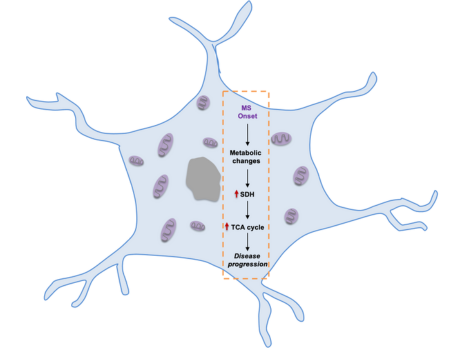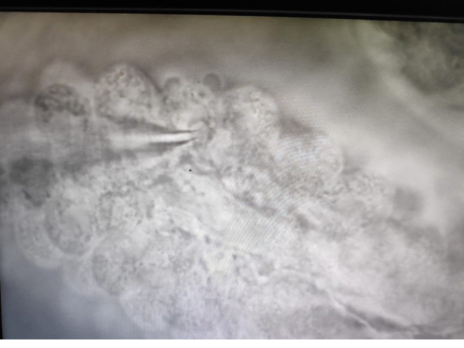
MetabolicMS
Recently, we used a MS animal model to perform high-throughput sequencing of astrocytes’ transcriptome during disease progression. Our data shows a surprising up-regulation of glycolytic and tricarboxylic acid (TCA) cycle…

I am an Assistant Researcher at the School of Medicine, University of Minho, Braga, Portugal.
I received my PhD in 2008 from Minho University where I studied choroid plexus (CP), a brain immune barrier. During that period, I found that CP act as a sensor of peripheral inflammation.
In 2013, I successfully acquired funding from the Portuguese Science Foundation (FCT) to study LCN2 role in brain physiology and in MS and to establish myself as an Assistant researcher. The project developed so far, and that I intended to foster, is key in bidirectional translational research.
In 2018, starting in 2019, I successfully acquired funding from the Portuguese Science Foundation (FCT) as a Principal investigator.
Stemming from the hypothesis that perpetuation of brain inflammation by local glia is leading to neurodegeneration even when there is no brain immune cell infiltration from the periphery, it is our aim to: 1) Perform basic translational experiments to answer the question if decreasing glia mediated inflammation is able to influence MS outcomes in a mouse model of disease; 2) Perform clinical translational experiments to answer the question if previous findings from mouse models are also implicated in the human disease. Besides ongoing experiments directed to continue the studies in LCN2, and further extend these studies to other astrocytic and microglia markers, we are now partnering with Braga Hospital, starting the consolidation of a biobank of MS patients.

I am an Assistant Researcher at the School of Medicine, University of Minho, Braga, Portugal.
I received my PhD in 2008 from Minho University where I studied choroid plexus (CP), a brain immune barrier. During that period, I found that CP act as a sensor of peripheral inflammation.
In 2013, I successfully acquired funding from the Portuguese Science Foundation (FCT) to study LCN2 role in brain physiology and in MS and to establish myself as an Assistant researcher. The project developed so far, and that I intended to foster, is key in bidirectional translational research.
In 2018, starting in 2019, I successfully acquired funding from the Portuguese Science Foundation (FCT) as a Principal investigator.
Stemming from the hypothesis that perpetuation of brain inflammation by local glia is leading to neurodegeneration even when there is no brain immune cell infiltration from the periphery, it is our aim to: 1) Perform basic translational experiments to answer the question if decreasing glia mediated inflammation is able to influence MS outcomes in a mouse model of disease; 2) Perform clinical translational experiments to answer the question if previous findings from mouse models are also implicated in the human disease. Besides ongoing experiments directed to continue the studies in LCN2, and further extend these studies to other astrocytic and microglia markers, we are now partnering with Braga Hospital, starting the consolidation of a biobank of MS patients.
Lipocalin 2 is a choroid plexus acute-phase protein.
Marques F, Rodrigues AJ, Sousa JC, Coppola G, Geschwind DH, Sousa N, Correia-Neves M, Palha JA. J Cereb Blood Flow Metab. 2008 Mar;28(3):450-5. doi: 10.1038/sj.jcbfm.9600557. Epub 2007 Sep 26.
Lipocalin 2 is present in the EAE brain and is modulated by natalizumab.
Marques F, Mesquita SD, Sousa JC, Coppola G, Gao F, Geschwind DH, Columba-Cabezas S, Aloisi F, Degn M, Cerqueira JJ, Sousa N, Correia-Neves M, Palha JA. Front Cell Neurosci. 2012 Aug 9;6:33. doi: 10.3389/fncel.2012.00033. eCollection 2012.
Lipocalin-2 is involved in emotional behaviors and cognitive function.
Ferreira AC, Pinto V, Dá Mesquita S, Novais A, Sousa JC, Correia-Neves M, Sousa N, Palha JA, Marques F. Front Cell Neurosci. 2013 Jul 29;7:122. doi: 10.3389/fncel.2013.00122. eCollection 2013.
Lipocalin 2 modulates the cellular response to amyloid beta.
Mesquita SD, Ferreira AC, Falcao AM, Sousa JC, Oliveira TG, Correia-Neves M, Sousa N, Marques F, Palha JA. Cell Death Differ. 2014 Oct;21(10):1588-99. doi: 10.1038/cdd.2014.68. Epub 2014 May 23.
From the periphery to the brain: Lipocalin–2, a friend or foe?
Ferreira AC, Dá Mesquita S, Sousa JC, Correia-Neves M, Sousa N, Palha JA, Marques F. Prog Neurobiol. 2015 Aug;131:120-36. doi: 10.1016/j.pneurobio.2015.06.005. Epub 2015 Jul 6.
Marques F, Sousa JC.Front Cell Neurosci. 2015 Apr 13;9:136. doi: 10.3389/fncel.2015.00136. eCollection 2015.
Mesquita SD, Ferreira AC, Gao F, Coppola G, Geschwind DH, Sousa JC, Correia-Neves M, Sousa N, Palha JA, Marques F.
Brain Behav Immun. 2015 Oct;49:280-92. doi: 10.1016/j.bbi.2015.06.008.
Lipocalin-2 regulates adult neurogenesis and contextual discriminative behaviours.
Ferreira AC, Santos T, Sampaio-Marques B, Novais A, Mesquita SD, Ludovico P, Bernardino L, Correia-Neves M, Sousa N, Palha JA, Sousa JC, Marques F. Mol Psychiatry. 2018 Apr;23(4):1031-1039. doi: 10.1038/mp.2017.95. Epub 2017 May 9.
Ferreira AC, Novais A, Sousa N, Sousa JC, Marques F. Sci Rep. 2019 Feb 7;9(1):1649. doi: 10.1038/s41598-018-38140-y.
das Neves SP, Serre-Miranda C, Sousa JC, Costa PS, Sousa N, Cerqueira JJ, Marques F. J Neuroimmunol. 2022 Jul 15;368:577872. doi: 10.1016/j.jneuroim.2022.577872. Epub 2022 Apr 18.

Recently, we used a MS animal model to perform high-throughput sequencing of astrocytes’ transcriptome during disease progression. Our data shows a surprising up-regulation of glycolytic and tricarboxylic acid (TCA) cycle…

The aim of this proposal is to study the blood-cerebrospinal fluid barrier (BCSFB) located at the choroid plexus (CP) level.



Phone: +351 253 604 967
Fax: +351 253 604 809
Email: icvs.sec@med.uminho.pt
Life and Health Sciences
Research Institute (ICVS)
School of Medicine,
University of Minho,
Campus de Gualtar
4710-057 Braga
Portugal

Copyright ©2022 ICVS. All Rights Reserved



Copyright ©2022 ICVS. All Rights Reserved
Life and Health Sciences
Research Institute (ICVS)
School of Medicine,
University of Minho,
Campus de Gualtar
4710-057 Braga
Portugal



Copyright ©2022 ICVS. All Rights Reserved
Life and Health Sciences
Research Institute (ICVS)
School of Medicine,
University of Minho,
Campus de Gualtar
4710-057 Braga
Portugal

